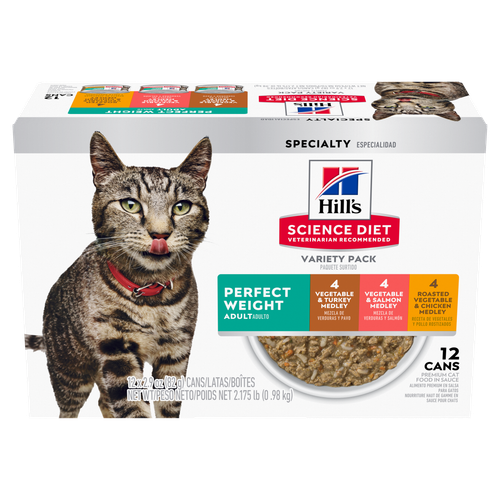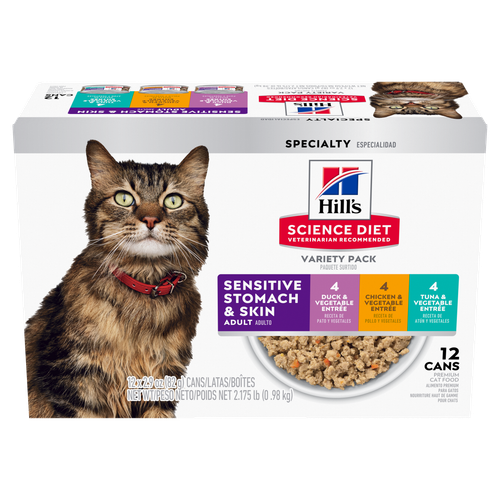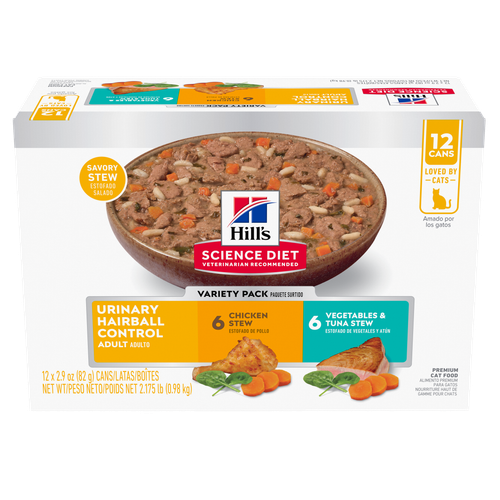
-
Find the right food for your petTake this quiz to see which food may be the best for your furry friend.Find the right food for your petTake this quiz to see which food may be the best for your furry friend.Featured products
 Hill's Science Diet Adult Chicken & Beef Entrée Dog Food
Hill's Science Diet Adult Chicken & Beef Entrée Dog FoodChicken & Beef Entrée in a delicious loaf with complete & balanced nutrition to help keep adult dogs active and healthy
Shop Now Adult Large Breed Chicken & Barley Recipe Dog Food
Adult Large Breed Chicken & Barley Recipe Dog FoodSupports healthy joints, lean muscle, and beautiful coat for large breed dogs
Shop Now Adult Chicken & Barley Recipe Dog Food
Adult Chicken & Barley Recipe Dog FoodSupports lean muscle and beautiful coat for adult dogs
Shop NowFeatured products Adult Perfect Weight Roasted Vegetable & Chicken Medley Cat Food
Adult Perfect Weight Roasted Vegetable & Chicken Medley Cat FoodOver 70% of cats lost weight within 10 weeks when fed this nutrition
Shop Now Adult Sensitive Stomach & Skin Duck & Vegetable Entrée Cat Food
Adult Sensitive Stomach & Skin Duck & Vegetable Entrée Cat FoodScience-backed nutrition tailored for skin and digestive health, packed with clinically proven, immune system supporting antioxidants.
Shop Now Adult Urinary Hairball Control Vegetables & Tuna Stew Cat Food
Adult Urinary Hairball Control Vegetables & Tuna Stew Cat FoodSupports the health of the whole urinary system with optimal levels of magnesium
Shop Now -
Dog
- Dog Tips & Articles
-
Health Category
- Weight
- Food & Environmental Sensitivities
- Urinary
- Digestive
- Joint
- Kidney
-
Life Stage
- Puppy Nutrition
- Adult Nutrition
- Senior Nutrition
Cat- Cat Tips & Articles
-
Health Category
- Weight
- Skin & Food Sensitivities
- Urinary
- Digestive
- Kidney
-
Life Stage
- Kitten Nutrition
- Adult Nutrition
Featured articles How to Properly Mix Wet & Dry Pet Foods
How to Properly Mix Wet & Dry Pet FoodsAn Orange cat eating from a bowl filled with mixed food
Read More The Science Behind Our Love for Pets
The Science Behind Our Love for PetsLearn the scientific reasons why we have such strong connections with our pets, and what science says about the love between humans and our furry friends.
Read More What Is Littermate Syndrome? Pet Adoption Guide
What Is Littermate Syndrome? Pet Adoption GuideLearn more about littermate syndrome in dogs and cats and how to successfully navigate adoption and early socialization processes.
Read More -


There's no denying the charm of a small dog. Loyal, animated and often cuddly, small dogs make excellent companions for homes of all sizes. They're easy to travel with, they tend to have long lifespans, and many are considered hypoallergenic and don't shed. That means less time sneezing or vacuuming up fluff around your home, and more time playing with your new best friend.
While not all small dogs lay claim to this trait, there are many small breed dogs that don't shed (or shed minimally). These dogs range from lazy snugglers to active, attentive hunters. Some have long, flowing hair; others are completely hairless.
Let's explore some of the many small breed dogs that don't shed, and identify the breed (or breeds) that would fit your lifestyle.

Does No Shedding = Hypoallergenic?
There's a common myth that "hypoallergenic" dogs may be completely incapable of causing an allergic reaction; unfortunately, that isn't the case A hypoallergenic dog is a one who is comparatively less likely to cause an allergic reaction. This is typically the case due to their lack of shedding — they release less dander & skin cells onto rugs or into the air. If you or someone you live with has allergies, be sure to do extra research to determine if a particular "hypoallergenic" dog is a good fit for you.
1. Affenpinscher
The brave, intelligent affenpinscher has a wiry, near-odorless coat and a playful sense of humor. Of all the small breed dogs that don't shed, affenpinschers are great pets as they require very little grooming, except for regular "stripping" of their coats. Stripping a dog's fur removes old, dull hair and keeps new, shiny hair, which reduces shedding.
2. Bichon Frise
According to the American Kennel Club, the bichon frise, "with its white color and soft, curly coat ... is ideal for people with allergies, as the coat is hypoallergenic to most." Bichons must be groomed frequently as their hair continuously grows (rather than sheds), which is why you often see them with their thick hair cut on the shorter side. If you're looking for a spirited, personable pup, this might be the dog breed for you.
3. Chinese Crested
The Chinese crested solves the problem of shedding almost completely. Chinese crested dogs can either be hairless or powderpuff. A hairless Chinese crested dog will only have hair on their heads, tail and feet. The powderpuff, on the other hand, features a coat of fine hair, but shedding is minimal. Care for these dogs looks a bit different than it does for a dog with hair or fur, as their skin is more susceptible to the elements. You'll want to bundle up your Chinese crested in the winter, and use a dog-safe sunscreen when walking outside.
4. Lhasa Apso
Small, calm and cuddly, Lhasa apsos have the perfect combination of energy and contentment. They're happy whether playing with you outdoors or resting beside you. It's best to keep these dogs' coats cut short or at least well-groomed, as their coats can become a bit unruly if left too long or not properly managed.


Tasty Tips
5. Maltese
You'll no doubt know the Maltese when you see one. Known as a toy dog for its size (typically eight pounds or less), Maltese have long, silky, flowing hair that requires frequent brushing but won't end up all over your furniture. These friendly, loving, gentle dogs are excellent snugglers and great family dogs.
6. Miniature Poodles
Poodles are often the first dogs many people think of when they think of small breed dogs that don't shed. Poodles are agile, highly intelligent and easy to train, making them an ideal pet for those who are ready to commit to their mental stimulation. Their curly coats do require some extra grooming, lest they become matted.
7. Miniature Schnauzer
Miniature schnauzers, known (and named) for their mustached noses, are smart dogs who are easy to train. Schnauzers love to be with their human companions, and they assimilate well to the city or the country. Brush and groom your Miniature Schnauzer weekly for the healthiest coat.
8. Scottish Terrier
Known for their big personalities, the Scottish terrier is another small breed option for those with allergies. These smart, independent dogs have weather-resistant coats of hair that do require maintenance to be healthy. Because they're terriers, they're known to be high-energy with hunting instincts.
9. Shih Tzu
Not unlike the Maltese, the shih tzu (or "little lion") has long, silky hair that must be brushed regularly. Shih Tzus are notably regal in appearance, with large, round eyes and a short, stout stance. These dogs are sweet, happy and energetic — excellent for families with small children.
10. Xoloitzcuintli
The Xoloitzcuintli, or "Mexican hairless," as they're sometimes called, can be hairless or have a (minimally shedding) coat of hair; however, even hairless Xoloitzcuintli have some hair on their heads. They love outdoor activities like brisk walks or intense play at the park. Because they're easily stressed, they're happiest and most peaceful in low-stress homes.
Whether playing with you or sleeping by your side, small breed dogs that don't shed are guaranteed to bring you joy. What's more, they can be relatively inexpensive compared to their larger counterparts, as they require less food and smaller doses of medicine. If you're looking for a long-term companion who will bring you endless joy, look no further than one of the small dog breeds above.


Erin Ollila believes in the power of words and how a message can inform—and even transform—its intended audience. Her writing can be found all over the internet and in print, and includes interviews, ghostwriting, blog posts, and creative nonfiction. Erin is a geek for SEO and all things social media. She graduated from Fairfield University with an M.F.A. in Creative Writing. Reach out to her on Twitter @ReinventingErin or learn more about her at http://erinollila.com.
Related products

Chicken & Barley Entrée in a delicious loaf with great taste and precisely balanced nutrition to support 5 essential building blocks for lifelong health

Supports healthy joints, lean muscle, and beautiful coat for large breed dogs

Chicken & Beef Entrée in a delicious loaf with complete & balanced nutrition to help keep adult dogs active and healthy

Supports lean muscle and beautiful coat for adult dogs
Related articles

Your dog's coat and skin are a big part of your dog's overall health. Ensure you keep your dog's coat healthy, by following these simple tips.

Wondering where can I buy a dog? Consider adoption and explore the pros and cons of adopting a dog from a breeder versus an animal shelter.

Learn how to help keep your dog's immune system in tip-top shape, including nutritional immune system support for dogs and other strategies.

Discover how the field of dog science is giving us more and more insights into the inner workings of our furry best friends.

Put your dog on a diet without them knowing
Our low calorie formula helps you control your dog's weight. It's packed with high-quality protein for building lean muscles, and made with purposeful ingredients for a flavorful, nutritious meal. Clinically proven antioxidants, Vitamin C+E, help promote a healthy immune system.
Put your dog on a diet without them knowing
Our low calorie formula helps you control your dog's weight. It's packed with high-quality protein for building lean muscles, and made with purposeful ingredients for a flavorful, nutritious meal. Clinically proven antioxidants, Vitamin C+E, help promote a healthy immune system.

